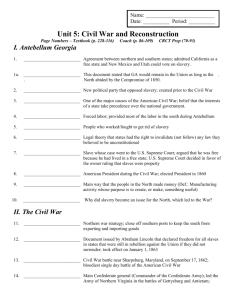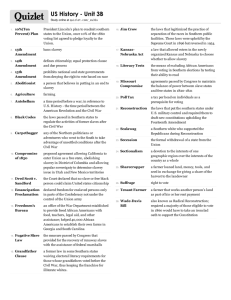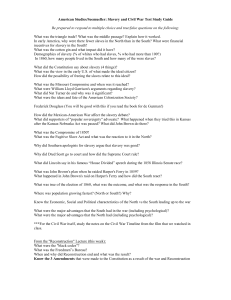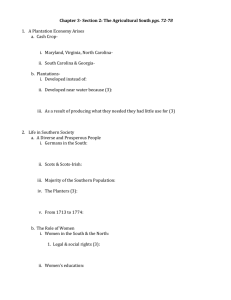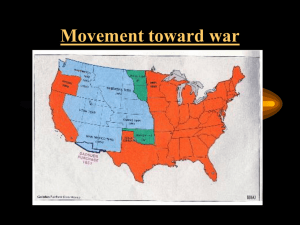The Civil War
advertisement
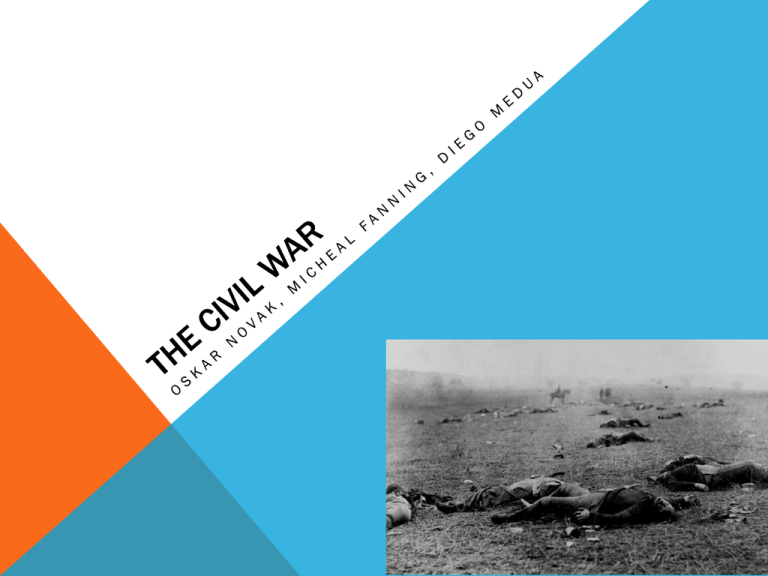
PRESIDENTS JAMES BUCHANAN- 1857-1861 DEMOCRAT • Dred Scott Decision- Court ruled that Property could not sue, and Slaves were not citizens • John Brown and Harper’s Ferry- Attack on a Virginia fort in order to secure Rifles for a slave mutiny. Failed since slaves never found out about it. Brown was hanged. • Panic of 1857- The panic was caused by over speculation and borrowing on railroad lands and on foreign markets. It made states follow independent treasury system. • September 20, 1860- After election of Lincoln South Carolina, Georgia, Mississippi, Alabama, Texas, Florida, Louisiana , seceded from union creating the Confederate States of America in 1861 • January 5, 1861 Fort Sumter- beginning of Civil war after failure to resupply Union Naval Base, or surrender of it to South. ABRAHAM LINCOLN • (1861-1865) Republican • Civil War- Causes-:Slavery, States rights, Sectionalism, Slaves Rights, etc. • Emancipation proclamation, freed slaves in southern states, but did not give them rights except for enlistment in army, also did not free slaves in four union slave states • Assassination- Shot at point blank to the head at Ford’s Theater by John Wilkes Booth on April 14. • Died few days later after the work of the surgeon. ANDREW JOHNSON • 1865-1869 Republican • Reconstruction- • Two view points • Radical republicans wanted to have a punishment for the South. • Johnson did not listen to party and formulated his own plan. • Provisional gov. By Francis Pierpont • Granted Amnesty to those with property value less than $20k • Senator Sutton fed up by stubbornness, passed radical iron clad reconstruction and five military districts. • Buchanan tried to fire Secretary Stanton after disagreement about the power of these districts and was impeached for violation of office of tenure act since he removed someone without senate consent. ULYSSES S. GRANT • • • • • • • • • • 1869-1877 Republican Passed fifteenth amendment through congress Used enforcement acts to give president power to use army against those who moved against fifteenth amendment. Civil rights act of 1875 expanded federal law enforcement by prohibiting discrimination on account of race in public accommodations, transport and jury service Scandals- Gold Ring on Black Friday The storage of gold through settling bonds by Corbin, proved devastating on Black Friday when a sudden burst of gold deflated the market and crashed a NY bank. Huge Scandal Credit Mobilier Scandal Included the bribery of railroad and senate officials in order to pass the plans for new railroad even VP. Needed to have federal funds to complete so gave senators stock options. RUTHERFORD B. HAYES • 1877-1881 Republican • Great railroad strike of 1877- • Created from wage reductions on workers on major railways. Put down by force. • Compromise of 1877- • An unofficial deal where Hayes was promised the presidency for The removal of all federal troops from the former Confederate States. The appointment of at least one Southern Democrat to Hayes's cabinet. • The construction of another Railroad using the Texas and Pacific in the South • This ended reconstruction THE CIVIL WAR • Causes- • Southerners wanting to preserve slavery and therefore King Cotton • Property rights or did slaves have rights, • Sectionalism • State’s rights, and territorial crisis aka Kansas-Nebraska act, Missouri Compromise. FAMOUS BATTLES • Major Battles- • Fort Sumter, start of war, • Gettysburg bloodiest battle and beginning of down fall for South, • Sherman’s March to the sea, slash and burn tactics used. TREATIES • Appomattox Courthouse Surrender VA- • Not a real treaty, since confederacy never really a nation • Ended civil war • Wade Davis Bill- • Idea to have southerners give an iron-clad oath in which they never helped confederacy or took arms against the U.S. • Treaties of Washington- treaties signed by native matriarchal societies before and after the war amnesty for all crimes committed against the United States prior to the treaties • Included specific provisions of peace and friendship toward the United States • Tribes acknowledgement of the supremacy of the United States Government • No federal legislation could interfere with their tribal organization • Tribes would provide Land Grants through Indian Territory CIVIL WAR SOCIAL IDEOLOGIES • “Rich man’s war and poor man’s fight”- the wealthy evaded the draft, while safely maintaining their lavish lifestyles • “War on slavery”- became a “war on slavery” after President Lincoln’s emancipation proclamation • Women’s responsibilities family • The planter dominated society of the South was uprooted - result of lack of men to work and provide for the RECONSTRUCTION SOCIAL IDEOLOGIES • Urban areas opportunities • African American churches • Became both social and political centers for the black community • • • • • - result of the migration of freed slaves looking for job Protected freedoms Reunited families Organized lives and communities Assisted in education Freedmen’s Bureau – assisted in the transition from slavery to freedom • Assisted in finding employment • Expanded education opportunities • Assisted with settlement RECONSTRUCTION SOCIAL IDEOLOGIES • Black Codes- laws in the former Confederate states that restricted the freedom of freed slaves • Legally no longer slaves, but still treated as slaves • Restrictions on black life and labor prevented significant upward mobility • Ku Klux Klan (“Invisible Empire of the South”) – Extreme white supremacist group • Terrorized, maimed, and murdered blacks • Made sure the freedmen “kept in their place” • Social Darwinism – “Survival of the Fittest” • The strongest end up as the wealthiest and the weakest end up without much wealth or power RECONSTRUCTION SOCIAL IDEOLOGIES • Push for women’s suffrage • Led by leaders such as: Elizabeth Cady Stanton, Susan B. Anthony, Lucy Stone, Julia Ward Howe • National Women’s Suffrage Association • Goals: Right to vote with black men, inclusion of women in the 15th amendment • American Women’s Suffrage Association • Goals: Gather support for women’s suffrage, 16th amendment for women’s suffrage • Strictly suffrage based MAJOR CIVIL WAR SUPREME COURT DECISIONS • Dred Scott v. Sandford • Dred Scott was a slave who sued for his freedom after being taken into the Wisconsin Territory (free territory) • Scott lost in a 7-2 vote • Stated that Congress had no power to prohibit slavery in the territories • Slaves were not citizens, as they were private property, thus they could not sue • Ex Parte Vallandigham • Unanimous decision: the Supreme Court had no power to issue a writ of habeas corpus to a military commission • Ableman v. Booth • A state court cannot grant a writ of habeas corpus to a prisoner arrested under US authority MAJOR RECONSTRUCTION SUPREME COURT DECISIONS • Ex Parte Milligan • Military tribunals could not try citizens • US v. Cruikshank • The Due Process Clause & the Equal Protection Clause of the 14th amendment only applies to state action and not individual citizens • First Amendment right to assembly wasn’t meant to limit the powers of the state governments • Second Amendment does not restrict the right to bear arms • Munn v. Illinois • Granger Case • Upheld the power of the government to regulate private industries • allowed states to regulate certain businesses within their borders, including railroads • Texas v. White • No state can unilaterally secede from the US • Does not recognize that any of the Confederate states ever left the Union MAJOR RECONSTRUCTION SUPREME COURT DECISIONS • Collector v. Day • Congress did not have the right to impose a tax on state officials • Ex Parte McCardle • Congress has the ability to make exceptions to the Supreme Court’s appellate jurisdiction • Ex Parte Garland & Cummings v. Missouri • 5-4 vote ruled test oaths could not be used to prevent former rebels from returning to their jobs • Mississippi v. Johnson • The passing of the Reconstruction Acts was a discretionary (required) task of the President, so he could not be sued CIVIL WAR/RECONSTRUCTION FOREIGN POLICY • 1861 Anaconda Plan – Union blockaded Confederate ports • Trent Affair – USS San Jacinto stopped a British mail ship that was carrying Confederate diplomats • British eventually sided with the Union because of the Emancipation Proclamation • Potential French-Confederate alliance – Confederate delegate, John Slidell offered cotton trade in exchange for of official recognition and assistance in breaking up the Union blockade • France wanted to take over Central America, but wouldn’t act without British support due to Union opposition • Deal eventually rejected by French due to British disapproval and the Union capture of key port, New Orleans CIVIL WAR/RECONSTRUCTION FOREIGN POLICY • Thomas W. Evans, unofficial diplomat between Lincoln and Napoleon, convinced the French of inevitable Confederate defeat • Prevented potential French support of Confederates • Russian Navy sent 2 fleets to US waters for 7 months in order to avoid potential war with the British and the French • “Seward’s Folly”- Alaska was purchased by William H. Seward for the US from because of its abundant natural resources and reluctance to upset their allies POLITICAL PARTIES Free Soil Party • Precursor to the republican party • Founded on anti –slavery ideology • Active from 1848 to 1854 • Members were absorbed by the republican party • Supported Wilmot Proviso • Rejected Kansas- Nebraska act POLITICAL PARTIES Republican party • Founded in 1854 • Formed to combat Kansas Nebraska act • Absorbed former Whigs and Free Soil party • "We should not care much whether those thus united (against slavery) were designated 'Whig,' 'Free Democrat' or something else; though we think some simple name like 'Republican' would more fitly designate those who had united to restore the Union to its true mission of champion and promulgator of Liberty rather than propagandist of slavery.“ –Horace Greeley POLITICAL PARTIES Republican party • By 1855 the republicans had a majority of in the house of representatives • In 1856 Republican Charles Sumner gave an anti slavery speech in the senate, two days later democratic Senetor Preston Butler assaulted him with his cane • By 1860 tensions between democrats and republicans were so high that South Carolina threatened to secede if a republican wins the election • !860 Republican Abraham Lincoln elected , South Carolina secedes POLITICAL PARTIES Democrats • As the civil war went on, congress was vacated of most democrats as they had formed their own government. • Before the war democrats strongly supported the expansion of slavery to protect their institution and way of life • After the war democrats remain very conservative and oppose inter racial societies • Southern democrats find new was to oppress blacks after slavery is abolished with the 13th amendment AMENDMENTS 13th amendment SECTION 1. Neither slavery nor involuntary servitude, except as a punishment for crime whereof the party shall have been duly convicted, shall exist within the United States, or any place subject to their jurisdiction. SECTION 2. Congress shall have power to enforce this article by appropriate legislation. AMENDMENTS 14th amendment Establishes • Birth right citizenship • Due process • Equal protection AMENDMENTS 15th amendment • SECTION 1. • The right of citizens of the United States to vote shall not be denied or abridged by the United States or by any state on account of race, color, or previous condition of servitude. • SECTION 2. • The Congress shall have power to enforce this article by appropriate legislation. PUBLICATIONS Republican party platform of 1860 and 1864 1860 “That in the recent vetoes by the federal governors of the acts of the Legislatures of Kansas and Nebraska, prohibiting slavery in those territories,” 1864 “That as slavery was the cause, and now constitutes the strength of this Rebellion, and as it must be, always and everywhere, hostile to the principles of Republican Government, justice and the National safety demand its utter and complete extirpation from the soil of the Republic; and that, while we uphold and maintain the acts and proclamations by which the Government, in its own defense, has aimed a deathblow at this gigantic evil, we are in favor, furthermore, of such an amendment to the Constitution, to be made by the people in conformity with its provisions, as shall terminate and forever prohibit the existence of Slavery within the limits of the jurisdiction of the United States.” PUBLICATIONS The Liberator Magazine publication printed by William Lloyd Garrison Increased sectionalism and tensions PUBLICATIONS Uncle Tom’s Cabin Reached Americans on an emotional level to stop apathy of the slave system PUBLICATIONS Emancipation Proclamation Freed slaves in belligerent states Made the civil war into a moral war
